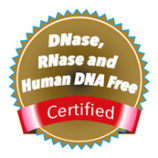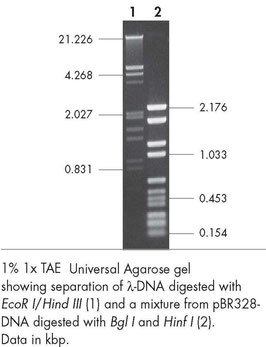Universal Agarose for gel-electrophoresis and an excellent price is ideal for use as standard agarose for analytical as well as preparative nucleic acid electrophoresis of fragments from 50 bp to 50 kbp.
Features:
– High separation properties and sharp band patterns
– Easy solubility without foaming
– Excellent optical transparency
Applications:
– Separation of PCR products
– DNA: approx. 0.05 kbp – 50 kbp
– RNA: approx. 0.30 kb – 20 kb
Specifications:
– Gelling temperature: ≤ 37 °C
– Melting temperature: ≤ 90 °C
– Electroendosmosis: ≤ 0.140
– Gel strength (1.5 %): ≥ 2300 g / cm2
– Sulphate content: ≤ 0.10 %
– Water content: ≤ 10.0 %
Quality Assurance:
‘Molecular Biology Grade’
– Certified free of DNases and RNases
– No DNA binding
– High lot-to-lot consistency
Storage: Agarose can be stored at room temperature for more than 4 years
| Product | Description |
| 6904-001 | Agarose for gel-electrophoresis Universal Agarose for gel-electrophoresis and an excellent price is ideal for use as standard agarose for analytical as well as preparative nucleic acid electrophoresis of fragments from 50 bp to 50 kbp. Even at low concentrations the gel produced is very firm. 100 gr |
| 6904-005 | Agarose for gel-electrophoresis Universal Agarose for gel-electrophoresis and an excellent price is ideal for use as standard agarose for analytical as well as preparative nucleic acid electrophoresis of fragments from 50 bp to 50 kbp. Even at low concentrations the gel produced is very firm. 500 gr |
| 6904-005-2 | Agarose für die Gelelektrophorese von DNA-Fragmenten Agarose-Gelelektrophorese ist eine molekularbiologische Methode, um Nukleinsäure-Stränge (RNA oder DNA) nach ihrer Größe zu trennen. Die Agarose von GeneON hat einen Größenbereich von ca. 50 bp bis 50kbp. 2 x 500 gr |
| 6904-005-5 | Agarose for gel-electrophoresis Universal Agarose for gel-electrophoresis and an excellent price is ideal for use as standard agarose for analytical as well as preparative nucleic acid electrophoresis of fragments from 50 bp to 50 kbp. Even at low concentrations the gel produced is very firm. 5 x 500 gr |
| 6904-005-10 | Agarose for gel-electrophoresis Universal Agarose for gel-electrophoresis and an excellent price is ideal for use as standard agarose for analytical as well as preparative nucleic acid electrophoresis of fragments from 50 bp to 50 kbp. Even at low concentrations the gel produced is very firm. 10 x 500 gr |
Usage of Agarose for gel-electrophoresis:
Method 1: Microwave oven
1. Pour buffer (approx. 90 % of final volume) into an appropriate flask that can accommodate up to four times the final gel volume and add a magnetic stir bar.
2. Put the flask with agarose onto a magnetic stirrer and slowly add agarose powder while stirring constantly to avoid clotting.
3. Remove flask magnetic stir bar.
4. Add remaining buffer up to the desired final volume.
5. Weigh and record the weight of of agarose and all components the flask prior to heating. Heat for 1 – 2 minutes in a microwave oven (600 Watt). Gently swirl the flask to mix the solution. Warning: Due to
microwave heating, there may be a delay in the liquid boiling!
6. Using the microwave oven, heat in short bursts of 5 – 10 seconds or until the solution withj agarose is boiling, with breaks of 10 – 15 seconds between heating phases to disperse bubbles by gently swirling the flask. Beware of hot glass ware and liquid. Continue until the agarose is completely dissolved.
7. Again, weigh the flask and top up lost volume with warm, deionized water. Gently swirl the flask to ensure complete mixing of agarose and all components.
8. Let the solution cool down at room temperature for 15 – 20 minutes or until a gel temperature of 50 – 60 °C is reached.
Method 2: Simmering water bath
1. see method 1 (agarose in micro wave oven): steps 1 – 2 and 4
2. Weigh and record the weight of the flask prior to heating. Heat agarose suspension up in a simmering water bath with constant stirring.
3. Leave the flask of agarose and all components bath in the water for further 15 – 20 minutes, or until the agarose is completely dissolved.
4. Switch off the magnetic stirrer and leave the flask with agarose in the bath for further 15 minutes.
5. Again, weigh the flask and top up lost volume with warm, deionized water. Gently swirl the flask to ensure complete mixing of agarose and all components.
6. Let the solution of agarose cool down at room temperature for 15 – 20 minutes or until a gel temperature of 50 – 60 °C is reached.

Material Safety Datasheet
